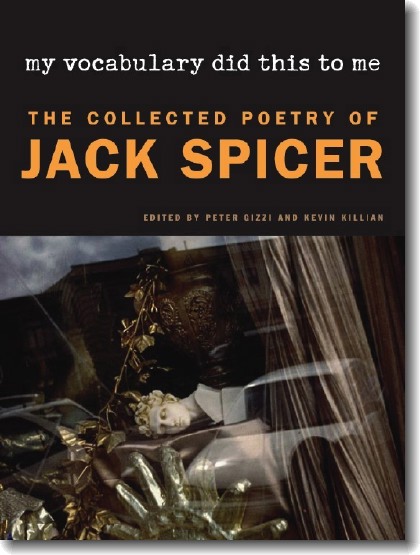Is it unseemly to review a book one has already blurbed? Particularly when the claim made – “one of the most important volumes of poetry published in the past 50 years” – is so extravagant? I’m convinced this statement is completely accurate, and it’s worth noting in addition that My Vocabulary Did This to Me: The Collected Poetry of Jack Spicer, edited by Peter Gizzi & Kevin Killian & just out in time to ask your parents to give it to you for Christmas, is also one of the best, and most enjoyable books of poetry you will ever read as well. It’s well worth finding that desert island in order to give yourself the time to properly spend with this book. You may never want to be rescued.
What makes Vocabulary different from, even better than, the justly famous Collected Books edited by Robin Blaser and published by Black Sparrow in 1975 that took Spicer’s reputation from being a secret shared by maybe two dozen post-avants to that of one of the major New American Poets, on a par with Ginsberg, Creeley, Ashbery, Snyder, Duncan et al, is three things. First, there is a lot of new material here, and not simply that which was later gathered together into One Night Stand. Consider “Homosexuality,” the third poem in the book, written sometime in 1945 or ’46:
Roses that wear roses
Enjoy mirrors.
Roses that wear roses must enjoy
The flowers they are worn by.
Roses that wear roses are dying
With a mirror behind them.
None of us are younger but the roses
Are dying.
Men and women have weddings and funerals
Are conceived and destroyed in a formal
Procession.
Roses die upon a bed of roses
With mirrors weeping at them.
The argument, which I’ve been known to make myself and which is implicit in the structure of The Collected Books, that Spicer wasn’t writing mature work until he reached the volume After Lorca, the book that leads of The Collected Books, a decade later, is rent asunder by counter-examples such as the poem above. Yes, maybe it’s a little more melodramatic & surreal than Spicer at his best, but the searing love poetry of Language and Book of Magazine Verse is absolutely visible in “Homosexuality.” There is roughly 100 pages of such material in Vocabulary before you reach After Lorca, and while much of that appeared in One Night Stand, gems like the poem above are new. It may be worth noting that when Spicer wrote this poem, the number of male American poets out of the closet consisted of Robert Duncan.
Second, this volume presents the work in chronological order while retaining the structure of Spicer’s mature work, when the book was the unit of composition he pursued – books are indicated in the table of contents in all caps, starting with AFTER LORCA, so that newly discovered texts, such as “Socrates” & “A Poem for Dada Day at the Place, April 1, 1958,” are positioned between A BOOK OF MUSIC & BILLY THE KID. GOLEM and MAP POEMS appear between THE HOLY GRAIL & LANGUAGE. MAP POEMS may not really constitute a book – the title comes from Gizzi & Killian – so much as notes toward the construction of another volume never to be realized by the dying Spicer, but they make sense as a group and are especially interesting positioned where they are, immediately after GOLEM, which I think is unquestionably the most significant of the new works (an edition was published by Granary Books in 1999), found among the papers of the late teacher & labor activist Jim Herndon by his widow Fran – they’d been members of the Spicer Circle as youngsters. This ordering of Spicer’s work shows the degree to which Collected Books really constitutes a “greatest hits” collection – and while it’s true that the greatest hits genuinely are home runs (Spicer would appreciate this metaphor), it makes even greater sense to see them in the context of all these line-drive doubles in the gap.
Third, Gizzi and Killian have been meticulous in their documentation and presentation of these materials. There are notations concerning the poems at the rear of the volume – you can find Spicer at the founding convention of the Mattachine Society,
So what we have here is a 426-page collection of all of Jack Spicer’s poetry contrasted with 267 pages in The Collected Books. The difference is even greater when you consider that Vocabulary uses a slightly smaller font to get more on a page than did Books, which used 10.5-point type & incorporated a 58-page essay by Robin Blaser in order to provide the book with the heft one normally associates with collected editions.
So, yes, this is one of the most important volumes published in the past 50 years. It is hands down the best book published in 2008. And it is one of the most powerful collections of poetry you will ever read. Need I say more?






